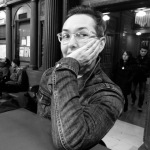By Alison Dowsett

As a freelance editor, it’s easy to fall prey to the fate of many freelancers across industries: the fate of over-delivery. Recently, I was telling my partner about an unconscious decision I made that resulted in significant scope creep. It happened while I was working with an independent author.
I was reading the third story in my client’s folio when it happened. The story’s set-up was promising, excitingly so: a young woman, recently graduated from a master’s program and dejected after a summer fling fizzles, decides to seek meaning and feminist camaraderie through a work exchange on a communally run feminist sheep farm.
The author and I met through a literary magazine where I acted as editor on a story of his that we subsequently published. For me, working with an author who had his combination of developed skill plus good time-management translated to a dual sense of gratification and thrill when revisions came in on time and with deftly incorporated feedback. And for the author, to work with an editor who is also queer was important after an experience with an agent who didn’t really get what he was trying to do.
Back on the sheep farm, the author may have been relying too much on cliché rather than solid characterization, but what really excited me was that he was touching on a piece of queer (lesbian) history that he wasn’t even aware of: the lesbian separatist back-to-the-land movement of the 1970s. The Van Dykes! Ariel Levy’s “Lesbian Nation” for The New Yorker!
This was where I decided to abandon the work plan we’d carefully drawn up in the editing agreement and took the opportunity to incorporate some little-known queer history into contemporary queer fiction. I felt I was doing the right thing, even though it led me to doing a much deeper edit on the folio of stories than what we’d agreed upon.
But I didn’t know that at the time; only after I was debriefing in my notes did I discover what I’d done. And then my partner chimed in, pointing out the aspects of editing that qualify it as care work. I didn’t understand this right away and, if I’m truthful, I put it right out of my mind because (a) to me, care work is nursing, child care, and the like, and so it was irrelevant to editing; and (b) like anyone living in a patriarchy, I had some internalized misogyny I didn’t want to confront.
My work as an editor also encompasses the mechanical dimensions of writing that don’t involve care, like when I prepare academic manuscripts for publishing. So why speak of editing as care work?
Should I speak about my editing style or my approach to editing, informed as it is by the lineage of the creative writing MFA, which is to say I’m also a writer, and one who pursues that elusive and intangible thing we call literature? Or about how I was led to editing for a literary magazine where I worked primarily with young writers and incorporated a lot of coaching into my work?
How does it benefit the editing community to speak of editing as care work?
If you care to consider this quick Wikipedia definition, “care work refers to those occupations that provide services that help people develop their capabilities, or the ability to pursue the aspects of their lives that they value.”
Teachers, athletic coaches, life coaches, counselling psychologists, and university professors are all doing care work.
And when I found this encapsulation of care work by feminist economist Nancy Folbre, it resounded in me like a church bell on Sunday: Care work is often differentiated from other forms of work because it’s considered to be “intrinsically motivated,” meaning people are motivated to pursue care work for reasons other than financial compensation.
I care immensely about art and literature; I care about relationships and the subtle and nuanced ways humans reveal their motivations, their characters; and I care so much about helping authors develop their stories into the highest and best versions possible. While it’s true I incorporate mechanics and mentoring into my editing work, I must admit that the core of my work ethic is service to the creation of art.
For me, editing is in the realms of art. And art matters. I remind myself of this every day because it’s taken for granted in our culture, and because I’m the person who pursued not one, but two creative writing degrees.
To speak of editing as care work is to speak of tempering instincts with good sense. Going back to my client and the little-known queer history, in the future, when I encounter a situation where it’s possible to dig in and go several editing levels deeper, I’ll recognize it and treat it as an opportunity to open a conversation to potentially upsell a service. So while it’s true that my ethic of care, left unchecked, led me to over-deliver with my client, I suspect it’s also the thing that’s going to lead me to the most rewarding projects of my career.
I trust my care ethic, and part of that trust is learning to recognize and cultivate it—for the good of my client and for my own satisfaction.
Alison Dowsett, MFA, BFA, is a writer and editor working in literary and academic publishing. Her written work has appeared in SubTerrain, The Science Creative Quarterly and Plenitude. She’s had an editorial hand in books published by Routledge and the University of Toronto Press.
This article was copy edited by Vilma Indra Vītols.


Thank you for your lovely piece, Alison. I had not thought of editing as care work, and of course it is. Brava!
LikeLike
So glad you enjoyed it Mary Anne, thank you!
LikeLike
So glad to hear it Mary Anne, thank you!
LikeLike